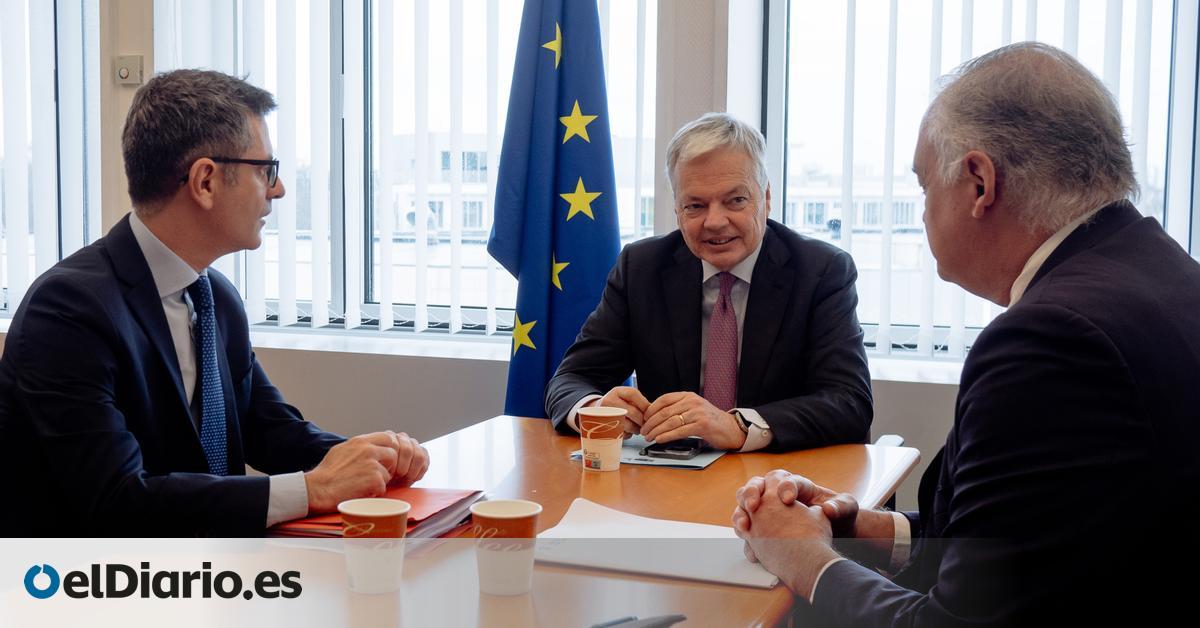
“It is evident that there are difficulties in reaching an agreement with a PSOE with whom it is very difficult to understand one another because it is very difficult to trust.” With this phrase, the parliamentary spokesperson for the PP, Miguel Tellado, confirmed this Tuesday that it is his party that cannot or does not want to reach an agreement with the PSOE to renew the General Council of the Judiciary, which the right has kept blocked for more than one year. of five years The mediation of the European Commission, requested by Alberto Núñez Feijóo himself, has concluded without any rapprochement being communicated between the parties.
It is the second time that talks have derailed since Feijóo assumed leadership two years ago. At the end of 2022, when the agreement was “in the absence of a word”, as they have repeatedly explained in the PP, they left the table for the reform of embezzlement and the repeal of sedition. Before, even with Pablo Casado at the head of the party, there was the leak of a message that took for granted the control that the right was going to exercise over the Judiciary with the election of Manuel Marchena as president.
The current negotiation was the third and there was an incentive to think that it could be the definitive one. In a meeting with Pedro Sánchez, Feijóo proposed resuming talks with the mediation of the European Commission. An idea that the President of the Government immediately accepted.
The intermediation fell to the Commissioner for Justice, Didier Reynders, a Belgian from the liberal family of the European Parliament. The Community Executive gave itself a period of “two months” to seek agreement through a “structured dialogue” that was based on the reports on the health of the rule of law in the member countries that the Commission itself produces each year.
The two deadlines had a meaning: Reynders will choose to head the Council of Europe, a body outside the EU. And this March was going to be his last as commissioner: now he will focus on campaigning. The Commission’s approach was clear: renew the CGPJ with the current law and “immediately afterwards” negotiate a reform of the law to change the appointment system and give more prominence to judges.
The PP reluctantly took on the approach, after having denied this option and demanding a joint and indissoluble process. Feijóo’s declared intention was to tie to the renewal of the CGPJ other reforms that the PP unilaterally demanded and that went beyond even the Judiciary itself: from the system of appointment of Constitutional magistrates to the conditions for accessing the State Attorney General’s Office.
The Minister of the Presidency and Justice, Félix Bolaños, and the Deputy Secretary of Institutional Affairs of the PP, Esteban González Pons, have met three times outside of Spain with the mediation of Reynders. And with each appointment, the agreement seemed to be further away.
After the first meeting, Brussels sent a clear message to the parties: the important thing was to renew the General Council of the Judiciary. The organization has been blocked for almost six years, its first president resigned and a legal reform promoted by the PSOE and Unidas Podemos in the last legislature prevents it from making appointments, which is a problem for judicial bodies such as the Supreme Court.
But the PP poured cold water. Pons said he left the meeting “very pessimistic,” and Bolaños responded that it would be “the last chance” for the agreement.
It was the end of January. A few days later, Feijóo surprised by once again linking the unblocking of the CGPJ to his other demands. “As long as everything is not closed, we will not be able to agree on anything,” said the leader of the PP, thus returning to the position prior to the start of the international mediation that he himself had demanded.
The second meeting was held in mid-February. And at its conclusion, the PP already considered amortized the Commissioner of Justice whose mediation they themselves had demanded. “If Commissioner Reynders finishes his term, I am convinced that the president, Ursula von der Leyen, will appoint another commissioner to fill the position,” he said. There was a month and a half left before the end of Reynders’ term.
But in the PP they had already decided that this time they were not going to renew the Judiciary either. In the midst of processing the amnesty law and with an electoral cycle ahead that included Galicia, the Basque Country and the European elections (and to which Catalonia has now been added). “Everything is a package,” an important source from the PP leadership then told elDiario.es. And that “pack” was indivisible. So much so that the renewal of the CGPJ and the legal reform that the right wants should be processed at the same time in Congress. And the legal changes, “as the first item on the agenda,” according to the same source, who joked about taking the talks beyond what was set by the Commission: “We are already quite late.”
The third meeting was held on March 13 in Strasbourg. And for the third time, the expectations of Reynders and the PSOE collided with the slowdown of the PP. While the commissioner said that he continued to “advance and progress,” Pons said that positions remained “frozen.”
Reynders launched one last proposal: a meeting at the end of March in Madrid. The appointment made by the commissioner, on March 27. This is how it appeared last Friday on his official agenda. The PSOE said it accepted the meeting, but the PP froze expectations.
On Monday it was confirmed that there would not be a fourth meeting due to the lack of progress. This Tuesday, Bolaños pointed directly to the PP from the press conference of the Council of Ministers. “Both the European Commission and we have made efforts but it has not been possible,” he said. “We will continue working as long as necessary. We all know for what reasons it is blocked,” Bolaños added, to bet on a new opportunity for Brussels’ role: “The Commission will have to make decisions about who continues in this mediation.”
Brussels, ready to continue
The cancellation of the meeting scheduled for this Wednesday comes, in fact, just when the two-month period given by the European Commission for mediation expires. Community sources admit that the ‘deadline’ was this end of March.
But after the Strasbourg meeting, the Commissioner for Justice opened the door for the Commission’s role to continue beyond the 31st. And Brussels has shown itself willing to expand it. “Discussions are ongoing between the parties and the Commission remains available to dialogue with them,” Justice spokesperson Christian Wigand said at a press conference on Tuesday.
What is clear to them in Brussels is that mediation cannot be prolonged ‘sine die’, especially when the Commission’s mandate will expire with the June 9 elections. “There is no decision or no change at the moment and we are not commenting now on possible next steps. “We are currently continuing to work on finding solutions when the time comes,” added Reynders’ spokesperson.
The Commission wants to give mediation one last chance, but it will no longer be Reynders who sits down with Bolaños and Pons. The Commissioner for Justice has requested a leave of absence – a kind of unpaid leave – once he has been formally designated as a candidate for the general secretary of the Council of Europe.
Everything indicates that it will be the vice president for Values and Transparency, Věra Jourová, who will temporarily assume the Justice portfolio. Czech politics also belongs to the liberal family, like Reynders, but the Spanish Government sees her in a better light given that they consider that Reynders has maintained positions close to PP and Ciudadanos, who have knocked on her door with all their national battles along the way. throughout the legislature.
And the Judiciary, bogged down
The crisis opened in the CGPJ due to an interim situation that dates back to 2018 threatens to take on an even greater dimension if the order launched by its interim president is carried out. Vicente Guilarte threatened to resign from the position he has held on an interim basis since last summer if the latest attempt at renewal between the PP and the PSOE with the intermediation of the European Commission fails. “I will be waiting for this agreement to occur and if it does not occur there are people more qualified than me to occupy this position,” he stated last February at a public event in Madrid.
“I don’t like being a toy of something that I don’t control,” said Guilarte at that event, who usually says that he holds the position of president for a “longevity criterion.” He was the oldest member when, last July, his predecessor, also interim, reached the legal retirement age, which is set at 72 years for judges and magistrates.
If he fulfills his order, the governing body of the judges will have to elect its third president in a year and a half after Carlos Lesmes resigned in October 2022 due to the blockage to the renewal of the body. The next oldest member is Wenceslao Olea, also elected at the time at the proposal of the PP. Guilarte’s departure, if it occurs, will leave the institution in an even more precarious situation with 16 members of its 21 original members: nine conservatives and six progressives.
During his mandate, Guilarte has made a proposal to leave the appointments of the judicial leadership that the CGPJ now makes in the hands of the judges themselves and a court of jurists. It is an initiative that seeks to reduce the attractiveness of the body as a political instrument of the parties but that, for the moment, has not had much echo among the parties that have to agree on the renewal.
Source: www.eldiario.es

